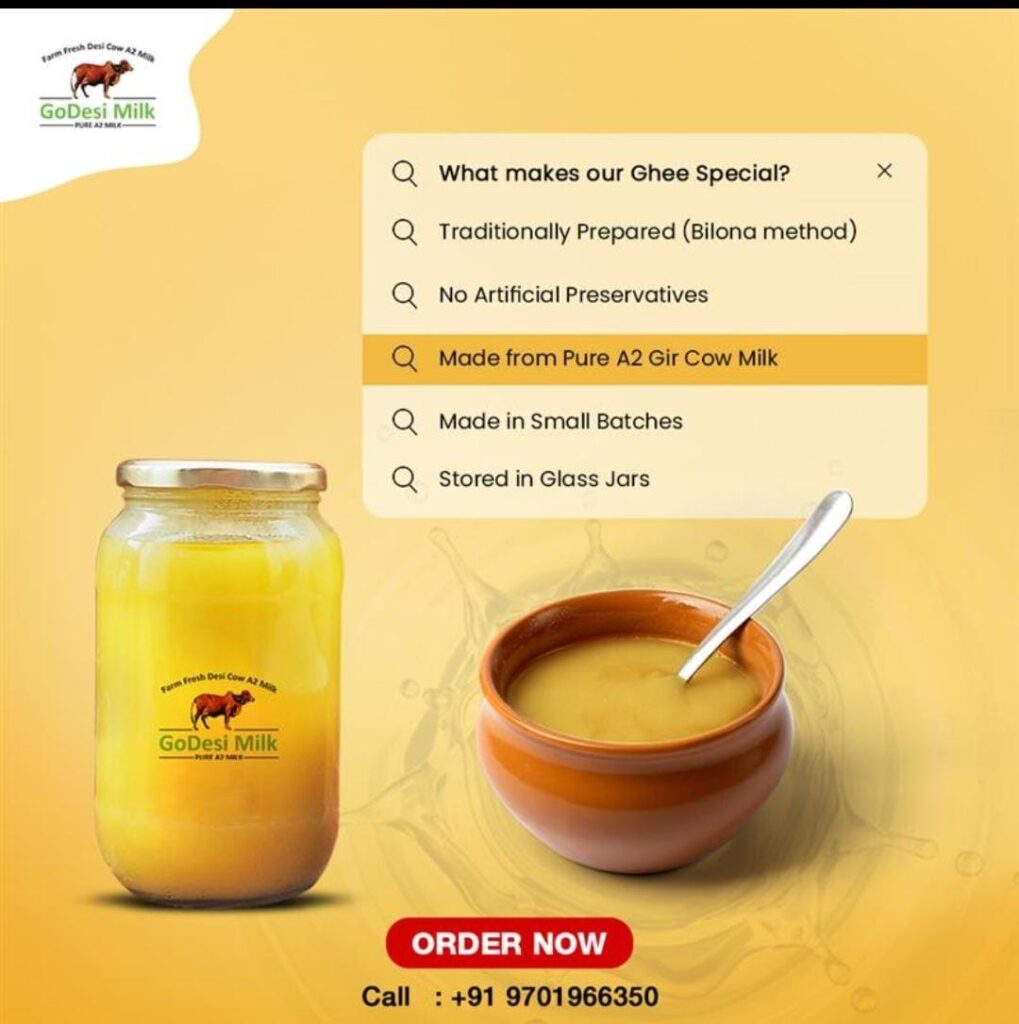Ghee has been used since ages because of the numerous health benefits it possesses. One of the major concerns swirling around ghee is how it affects your cholesterol level. Ghee, which is also called clarified butter, is beneficial for health when consumed rationally. If you are having high cholesterol levels, then consuming foods with saturated fats and high cholesterol content will worsen your condition. However, when it comes to ghee, you can take it in moderation even though it contains saturated fats because it provides several health benefits.

The smoking point of ghee: what is unique about it?
As the proverb goes- “the more, the merrier”. The rule applies to a higher smoking point of oil. We can easily say that the higher the boiling point, the better the oil for cooking. Pure ghee offers a boiling point of 482 degrees Fahrenheit i.e around 250 degrees celsius. The boiling point same as the smoking point of ghee is higher than other cooking oils and fats like butter.
The boiling point of ghee is one of the blessed features of this dairy oil. The holistic quality of ghee and hassle-free scope of use have snatched prestige and demand for this dairy. Ghee is lactose and casein free making it a good choice for lactose intolerants.
It remains safe for cooking against high flame. Due to its stability it carries less risk of free radical formation. This better butter can be safely used for high-temperature cooking methods like baking, roasting, sauteing, grilling, etc.
However, only unadulterated grass-fed ghee can offer such a high boiling point and all the ghee benefits can find their way toward you. To taste the claim of nutrition, you should use grass-fed cow’s ghee.
Ghee and cholesterol – All you need to know!
People prone to high cholesterol levels should be mindful of their eating choices. High-fat foods are the trigger to spike cholesterol levels but ghee is often mistaken by people to be bad for health. In fact, ghee cholesterol can help you in maintaining ideal cholesterol levels when you consume it in the right quantity. Heedlessly consuming anything will harm your health. The same applies to ghee. Make sure you consume pure cow ghee in moderation to get the best out of it.
Unfortunately, there are many myths about ghee consumption that need to be bunked. People stigmatize ghee as a high-fat and unhealthy option. However, the truth is ghee has been used for ages for the health benefits it has and pure cow ghee has made it to the healthy category of foods in the market. Cholesterol in ghee is usually good underlined; you are opting for organic and pure grass-fed ghee.
To know the benefits of consuming ghee, you must understand the cholesterol in ghee.
How Much Cholesterol Found in Ghee?
If you take 1 tablespoon of clarified butter(ghee) it has 7.5-8.0 grams of saturated fats and around 32-33 mg of cholesterol. It is recommended by experts that if you have high cholesterol levels you should limit your daily ghee intake to less than 1-2 tsp each day.
When you intake grass-fed ghee in the right quantity, it increases the HDL (good cholesterol) and helps to reduce the LDL (bad cholesterol) in the blood. Hence, cholesterol in ghee is considered healthy.
How does ghee affect cholesterol levels?
If you want to keep your cholesterol levels under control then moderate consumption of grass-fed ghee will cause you no harm. If you consume a balanced diet and eat ghee daily, your bad cholesterol will not spike in many cases. However, if you live a sedentary life and your eating choices are poor and you consume ghee daily then your LDL levels will worsen. How the consumption of ghee impacts your cholesterol levels depends on the quantity you are consuming and other factors like your lifestyle, diet, genetic makeup and digestive health.(For more info on cholesterol management , read my previous article)
Is ghee good or bad for cholesterol?
Ghee is cholesterol-friendly even though it belongs to high-fat-content foods. Cow’s ghee has CLA which is good fat required by the body to get rid of the bad cholesterol. Ghee and cholesterol relation should not be considered totally negative if you know the correct quantity and process to consume it. Also good amount of butyrates present in ghee makes it absolutely gut friendly. Additionally it provides fat soluble vitamins like A,D ,E,K making it a super ingredient in your kitchen shelf.
Bottomline
This articles basically aimed at debunking many myths about ghee consumption . Ghee provides essential vitamins to the body which makes it suitable for a nutritious and heart friendly diet. The best part is that you can make numerous recipes using ghee that will make your cuisine an absolute delicacy. Whether or not consuming ghee works in your favor depends on how righteously you are consuming it.
Having antioxidant properties, the consumption of ghee can reduce the risk of certain cancers, heart diseases, arthritis, etc. It can also help to keep your cholesterol levels maintained if you intake it in moderation. Its higher smoking point, versatility and suitability with all types of cooking makes it a premium category culinary fat. Inorder to know more about ghee and buzz kill the myths about ghee you need contact your qualified nutritionist.
So next time you head towards your kitchen do not forget to bring your better butter in better use.
